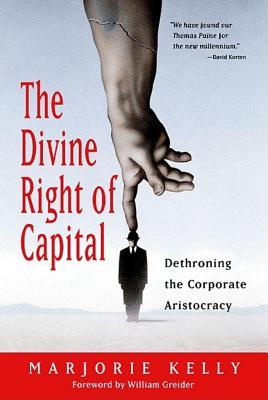

 |

|

The average rating for The divine right of capital based on 2 reviews is 4 stars.
Review # 1 was written on 2007-05-21 00:00:00 Trevor Mazzucchelli Trevor MazzucchelliFirst off, I should mention that Marjorie Kelly is one of two Minnesotans (the other is Paul Wellstone) in Robert Shetterly's stunning Americans Who Tell the Truth portrait collection. As for this particular book: those who think "shareholders" are an important and necessary economic force are in for a shock. She's pretty convincing that their economic gains are a sure sign that workers, neighbors, and other stakeholders are getting screwed. What I took away from this book is that shareholders are (often inadvertent) parasites. Here's an excerpt: Employees might be shouldering a crushing workload, doing without raises for years on end. Still we will say, "the corporation did well." We do not see rising employee income as a measure of corporate success. Indeed, gains to employees are losses to the corporation. And this betrays an unconscious bias: that employees are not really part of the corporation. They have no claim on the wealth they create, no say in governance, and no vote for the board of directors. They're not citizens of corporate society, but subjects. Investors, on the other hand, may never set foot inside "their" companies, may not know where they're located or what they produce. Yet corporations exist to enrich investor alone. In corporate society, only those who own stock can vote - like America until the mid-1800s, when only those when owned land could vote. Employees are disenfranchised. We think of this as the natural law of the free market, but it's more accurately the result of the corporate governance structure, which violates free-market principles. In a free market, everyone scrambles to get what they can, and they keep what they earn. In the construct of the corporation, one group gets to keep what another earns. Essential reading. |
Review # 2 was written on 2011-07-24 00:00:00 Kelly Ruggeri Kelly RuggeriIn many ways, this is a significant book with many good ideas. And I agree with most of what the author says. But I gave the book only three stars, mainly because it seems to contain wishful thinking for the most part. In the ten years since its publication, the nation has moved toward strengthening the corporate aristocracy, not dethroning it. The kind of revolution Kelly talks about may occur sometime, but probably not during my lifetime (which may be less than twenty years) or even during the lifetime of my children. Maybe my grandchildren will see the changes she calls for. But maybe not. In spite of my mediocre rating, I recommend the reading of this book. Even if much of what she says about solutions are "pipe dreams," still it is important to consider well Kelly's analysis of the current economic situation in the U.S. (and the rest of the "developed" world). The whole point of the book is that just as in the past European society eradicated the idea of the divine right of kings, so now we need to get rid of the idea of the divine right of capital. Further, just as the Western world has moved to political democracy, now there must be a move toward economic democracy. I certainly would like to see ratification of her proposed constitutional amendment: "Equality of rights under the law shall not be denied or abridged on account of race, sex, or wealth" (pp. 168-9). But, again, the chances of such an amendment being adopted and enforced are slim indeed. |
CAN'T FIND WHAT YOU'RE LOOKING FOR? CLICK HERE!!!